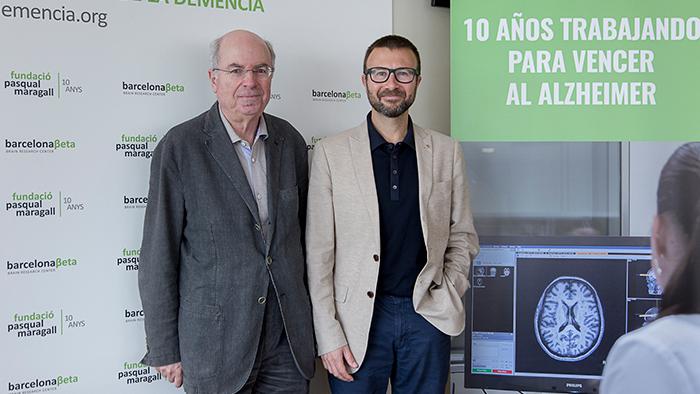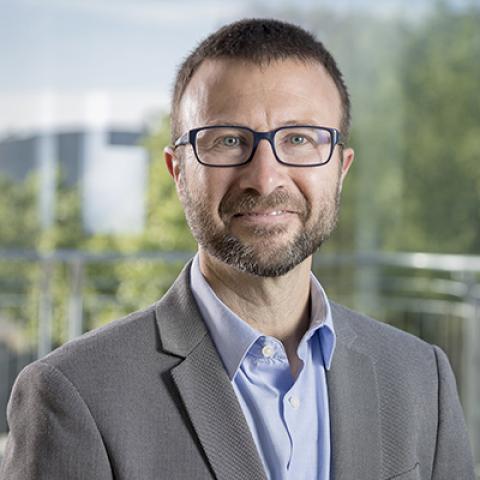14 May | 2018
The Pasqual Maragall Foundation presents a unique study in the world that will analyze the risk of developing dementia in the next 5 years

Barcelonaβeta Dementia Prevention Research Clinic
In the framework of the commemoration of the tenth anniversary of its creation, the Pasqual Maragall Foundation takes a revolutionary step in the fight against Alzheimer's with the presentation of a pioneering project focused on the prevention of dementia. "Changing the history of this disease is possible and today we are closer to make it a reality," said its director, Dr. Jordi Camí.
This is the Barcelonaβeta Dementia Prevention Research Clinic, promoted by the Barcelonaβeta Brain Research Center (BBRC), the research center of the Pasqual Maragall Foundation.
The Dementia Prevention Research Clinic
This research clinic, unique in the world, will study the risk of developing 5-year dementia in people with subjective memory complaints and the biological basis of that risk. Likewise, it will analyze if revealing this information generates an emotional impact on the participants and a personalized action plan will be offered that allows them to reduce their risk.
This plan will have primary prevention advice to reduce the modifiable risk factors of the disease, and with the possibility of participating in specific studies for the detection and prevention of Alzheimer's disease.
The research participants
The study, which lasts 3 years, needs to incorporate 400 volunteers between 60 and 80 years old, who are experiencing a decrease in memory or other cognitive abilities, but who have not been diagnosed with Alzheimer's disease and are not participating in another investigation study. "Participation in this study is an invaluable contribution to progress in the scientific discovery of effective ways to prevent or delay dementia" says Dr. José Luis Molinuevo, scientific director of the Alzheimer's Prevention Program promoted by the Pasqual Maragall Foundation.
Participants must meet the following inclusion criteria:
- Be between 60 and 80 years old.
- Be noticing a decrease in their cognitive abilities (for example, memory, concentration, planning, orientation or language).
- Being able to go to the visits accompanied by a relative or close person who knows her/him well enough to be able to report on her/his cognitive performance in everyday life.
- Not having contraindicated the performance of an MRI. This is the case of people who carry electronic implants (such as a pacemaker) or metallic implants in the upper part of the body.
- Not having been diagnosed with any type of dementia.
- Do not suffer from a significant illness or unstable medical condition that may cause difficulties in completing the study.
- Not participating in another research study related to memory or cognition.
¿Would you like to participate?
For those who meet the inclusion criteria and are interested in participating, the website www.prevenciondemencia.org has been enabled, in which interested persons must complete a questionnaire through which their suitability to participate in the clinical research study in prevention of dementia will be assessed.
The selected volunteers will be visited by a neurologist at the Barcelonaβeta Brain Research Center, in Barcelona, where they will also undergo cognitive, neuroimaging and genetic tests. Based on the information gathered in these tests, a risk algorithm will be applied that will indicate the estimated risk percentage of suffering dementia in the next 5 years, and participants will be offered a personalized action plan with strategies to improve their brain health and to reduce the risk of suffering from dementia. Participants will also have the possibility of participating in specific studies and clinical trials for the prevention of the disease.
In addition to investigate if there is a biological basis associated with the calculated risk algorithm, the project will also study the effect that the fact of individually revealing this risk percentage and its possible emotional impact may have, as well as the benefits that may be derived from the inclusion and participation in the study.
It is important to emphasize that the term risk implies a probability, not a certainty. In the same way that no one is exempt from the possibility of suffering from dementia, neither can 100% be guaranteed that someone will suffer from it. There are many variables that come into play and there is not enough knowledge about all of them. The knowledge generated by this new project will contribute to the modulation and improvement of the estimation of this risk.











